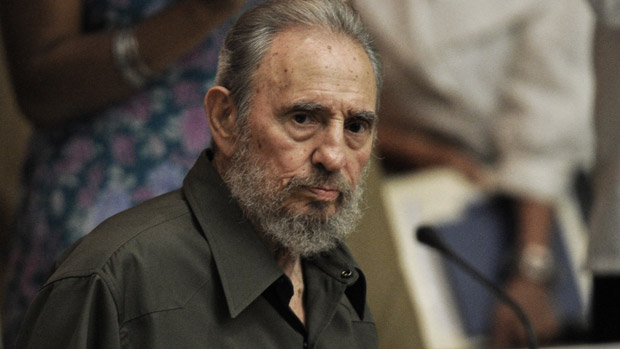China awards Confucius peace prize to Cuba’s Fidel Castro
Former Cuban leader awarded ‘China’s Nobel’ but does not travel to receive Confucius prize in person

A free daily email with the biggest news stories of the day – and the best features from TheWeek.com
You are now subscribed
Your newsletter sign-up was successful
China has awarded Fidel Castro the fourth annual Confucius Peace Prize, dubbed ‘China’s Nobel’. The former leader of Cuba did not travel to China to receive the honour, which was collected on his behalf by a Cuban exchange student, the South China Morning Post (SCMP) reports.
Other nominees for the prize, which was established in 2010, included United Nations secretary-general Ban Ki-moon and South Korean President Park Geun Hye.
The choice of Castro sets China at odds with the US, where Castro – a hero to many on the political left in Europe – is seen as having been a repressive dictator.
The Week
Escape your echo chamber. Get the facts behind the news, plus analysis from multiple perspectives.

Sign up for The Week's Free Newsletters
From our morning news briefing to a weekly Good News Newsletter, get the best of The Week delivered directly to your inbox.
From our morning news briefing to a weekly Good News Newsletter, get the best of The Week delivered directly to your inbox.
The award follows China’s president Xi Jinping’s visit to Cuba in July, during which he enjoyed a rare meeting with the 86-year-old Castro. After falling seriously ill in 2006, the retired Cuban leader handed power to his younger brother Raul. He now makes few public appearances.
Xi said the opening-up of Cuba’s economy overseen by Raul Castro had created new opportunities to strengthen bilateral ties between the two single-party communist nations, the SCMP reported in July.
Castro was praised by the academics who awarded the prize for his “important contributions” to nuclear disarmament. The SCMP quotes the state-run Global Times: “While in office, Castro did not resort to violence or force to settle disputes in international relations, especially with the United States.
“After his retirement, he has been actively meeting with leaders and groups from all over the world and has made important contributions … to eliminate nuclear war.”
A free daily email with the biggest news stories of the day – and the best features from TheWeek.com
The timing of the announcement suggests the award is intended as a Chinese response to the Nobel Peace Prize, which was given yesterday jointly to teenage Pakistani activist Malala Yousafzai, who survived being shot in the head by the Taliban and now campaigns for girls’ education, and Kailash Satyarthi, an Indian children’s rights campaigner.
Taiwanese vice-president Lien Chan was given the first Confucius Peace Prize in 2010, just two days before the Nobel Peace Prize was awarded to jailed Chinese dissident Liu Xiaobo. The first trophy was awarded at a chaotic press conference in Beijing where Chan’s aides said they had not been notified of the existence of the prize.
While the Confucius Peace Prize is thought to have been set up by the Chinese government, according to a Wall Street Journal blog, Chinese officials have since tried to distance themselves from the prize. In 2011, they announced it would be discontinued.
The controversial prize is now awarded by the China International Peace Studies Center, a group of academics not affiliated to the government. Some analysts have suggested that China may hope the prize will gain more international credibility if it is independently run. Another previous winner (in 2011) was Russia's Vladimir Putin.
-
 Regent Hong Kong: a tranquil haven with a prime waterfront spot
Regent Hong Kong: a tranquil haven with a prime waterfront spotThe Week Recommends The trendy hotel recently underwent an extensive two-year revamp
-
 The problem with diagnosing profound autism
The problem with diagnosing profound autismThe Explainer Experts are reconsidering the idea of autism as a spectrum, which could impact diagnoses and policy making for the condition
-
 What to know before filing your own taxes for the first time
What to know before filing your own taxes for the first timethe explainer Tackle this financial milestone with confidence
-
 Epstein files topple law CEO, roil UK government
Epstein files topple law CEO, roil UK governmentSpeed Read Peter Mandelson, Britain’s former ambassador to the US, is caught up in the scandal
-
 Iran and US prepare to meet after skirmishes
Iran and US prepare to meet after skirmishesSpeed Read The incident comes amid heightened tensions in the Middle East
-
 Israel retrieves final hostage’s body from Gaza
Israel retrieves final hostage’s body from GazaSpeed Read The 24-year-old police officer was killed during the initial Hamas attack
-
 China’s Xi targets top general in growing purge
China’s Xi targets top general in growing purgeSpeed Read Zhang Youxia is being investigated over ‘grave violations’ of the law
-
 Panama and Canada are negotiating over a crucial copper mine
Panama and Canada are negotiating over a crucial copper mineIn the Spotlight Panama is set to make a final decision on the mine this summer
-
 Why Greenland’s natural resources are nearly impossible to mine
Why Greenland’s natural resources are nearly impossible to mineThe Explainer The country’s natural landscape makes the task extremely difficult
-
 Iran cuts internet as protests escalate
Iran cuts internet as protests escalateSpeed Reada Government buildings across the country have been set on fire
-
 US nabs ‘shadow’ tanker claimed by Russia
US nabs ‘shadow’ tanker claimed by RussiaSpeed Read The ship was one of two vessels seized by the US military